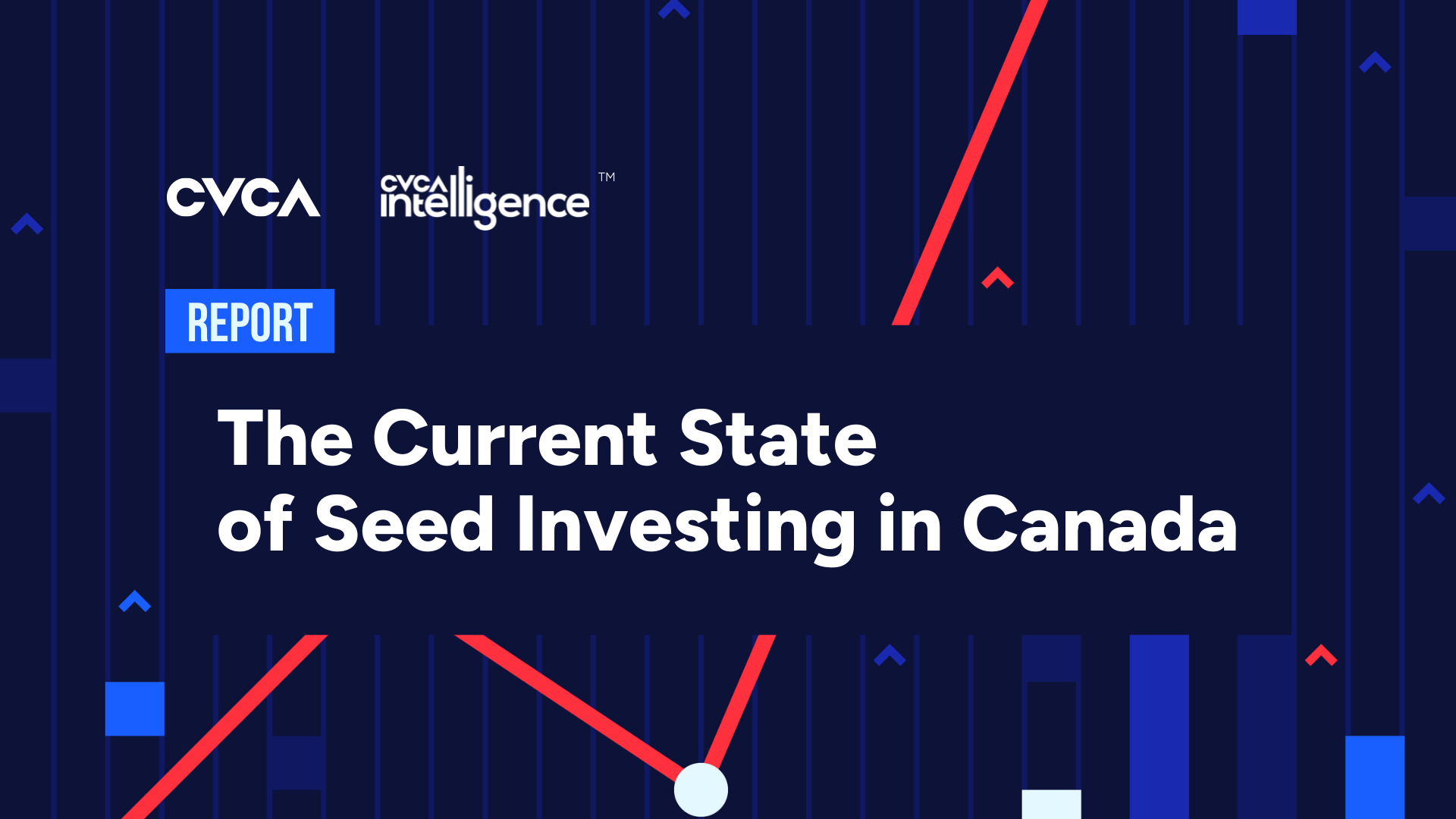Canada’s AI sector has experienced rapid growth in recent years, driven by active investors, innovative companies, and leading research hubs.
From autonomous driving technology to agritech, Canadian AI startups have been attracting significant VC interest in recent years in line with the global AI boom. According to Deloitte’s 2023 AI report, Canada ranks 3rd among G7 countries in total funding per capita for generative AI companies.
Venture capital interest in Canadian AI companies is growing, but investors believe more needs to be done to support Canada’s AI startup ecosystem, empower both VCs and founders, and enable Canadian startups to thrive beyond the early stage.
This article breaks down the major Canadian players and trends in the AI industry, with analysis covering the past 10 years of VC and PE activity among Canadian AI companies, from August 21, 2014 to August 21, 2024. Dollar amounts are represented in CAD.
*Only completed deals were included in the figures. Grants were also excluded from the data.
Number of VC and PE deals and deal sizes, 2014-2024
Over the past 10 years, venture capital and private equity interest in the Canadian AI sector has been on the rise. The number of VC and PE deals into Canadian AI companies has seen steady annual growth since August 2014.
Notable contributions include Radical Ventures’ early and continued investments in top AI firms like Cohere, positioning the firm as a key player in the ecosystem. Radical’s recent $800 million AI growth fund further highlights the importance of sustained and substantial investments to maintain Canada’s competitive edge globally.
In terms of VC activity, the number of VC deals has peaked in 2022 so far, with 585 completed deals.
The Canadian federal government began heavily investing in AI in 2017, with the establishment of the Pan-Canadian Artificial Intelligence Strategy. A combined $936 million dollars in AI research funding from CIHR, NSERC, and SSHRC from the strategy helped support domestic AI companies’ activity.
Since 2017, the number of VC deals in the Canadian AI space has seen an overall upward trend.
In terms of total amounts of VC capital raised, Canadian AI companies have also seen a general upwards trajectory, peaking in 2021 with several major deals of over $100 million, including: AI computing company Tenstorrent’s $245 million Series C round, biotech company Deep Genomics’ $226 million Series C, and AI computing infrastructure company QScale’s $195 million funding round.
However, since peaking in 2021, annual venture capital raised by Canadian AI startups had not surpassed those same heights—until now. While data from Pitchbook suggests that the levels haven’t been matched, CVCA Intelligence reports a substantial $408 million raised as of H1-2024 year-to-date, surpassing the 2021 peak of $310 million. The strong performance identified by CVCA suggests investor confidence in the sector, underscoring Canada’s growing prominence in the global AI landscape.
In terms of PE activity, Canada has also seen an overall increase in deals in recent years, increasing from just 4 PE deals in 2015 and 2016 to a peak of 36 last year.
In terms of PE deal sizes, amounts have fluctuated over the years, with notable peaks in 2019, with St. John’s-based financial crime management company Verafin closing $515 million in equity and debt recapitalization, and in 2023 when Austin-based UGC and social commerce company Bazaarvoice acquired Edmonton-based AI-driven e-commerce contextualization company Granify.
“Canada’s startup ecosystem has greatly matured over the last decade, with more repeat founders and experienced entrepreneurs building companies,” said Sam Haffar, Partner at Montreal-based early-stage VC firm, Real Ventures.
Canada’s trend in both the number of VC deals and total amount of VC investment has largely mirrored the global trend, as seen in the charts below.
Haffar also highlighted Canada’s strong AI talent and distinguished research institutions such as the University of Toronto, McGill, the Vector Institute, and Mila, as key factors setting the country apart globally.
“Beyond talent, Canada fosters a unique collaborative spirit among academia, industry, and government, accelerating knowledge transfer and commercialization.”
Eric Bukovinsky, partner at Vancouver-based VC firm, Yaletown Partners, echoed Haffar’s point, noting that the establishment of joint academic and research groups like Mila, Amii, and the Vector Institute that are on par with U.S. institutions helped attract significant VC interest to Canadian companies.
Bukovinsky was a member of the AI Commercialization Working Group that supported the Government of Canada’s Advisory Council on Artificial Intelligence to find ways to translate Canadian AI into economic growth.
“A lot has been built on the research by academic leaders in the space even prior to establishment of AI as a VC sector,” he said.
Major Canadian AI companies
As of August 21, 2024, Cohere, a generative AI company that creates large language models (LLMs) for businesses, has raised the most venture capital out of any Canadian AI startup in the past 10 years, at $1.27 billion.
The Toronto-based AI company just raised $683 million in their Series D round in July.
Founded in 2019, Cohere is an enterprise-focused competitor of other generative AI companies that create LLMs, like OpenAI and Anthropic. Its founders, Aidan Gomez and Nick Frosst are former members of the Google Brain team, Google’s former exploratory AI team.
This past April, Cohere launched Rerank 3, its newest foundational model.
Other major Canadian AI companies include Quebec City-based AI SaaS software Coveo, Toronto-based self-driving trucking company Waabi, and Toronto-based AI chatbot, Ada.
Thomas Park, lead of BDC’s Deep Tech Venture Fund, highlighted Canada’s “outstanding” AI talent–mentioning Aidan Gomez, co-founder of Cohere and Raquel Urtasun founder of Waabi–as a key factor to the sector’s increase in VC interest over the past years.
“That’s a big part, the AI talent and their willingness to commercialize,” he said.
Top cities for Canadian AI startups
Unsurprisingly, Canada’s largest city, Toronto, leads the country with the highest concentration of AI startups, hosting the headquarters of over 454 AI companies.
Toronto is home to some aforementioned heavy hitters like Cohere, Waabi, Tenstorrent, Deep Genomics, and Ada.
The city is also home to the Vector Institute and the University of Toronto’s Department of Computer Science, where Cohere’s Gomez studied and Waabi’s Urtasun is currently a professor.
Montreal comes in second, home to Mila, the renowned AI institute, as well as companies like industrial tech startup Vention and online mortgage lender Nesto.
Vancouver ranked third, home to competitor and market intelligence company Klue, robotics startup Sanctuary AI, and workforce analytics company Visier.
Biggest AI funding rounds
Cohere recorded the two biggest funding rounds among Canadian AI companies in the past 10 years, raising $683.9M in their Series D and $365.3M in their Series C rounds.
Cohere’s Series D funders included South Korea’s AJU IB Investment, AMD Ventures, Cisco Investments, Export Development Canada, Fujitsu, Gauntlet Ventures, AI-focussed IronArc Ventures, Nvidia, and Oracle, among others. Notably, Radical Ventures, a key early investor in Cohere since their Series A, has continued to play a significant role in their growth, supporting their mission.
Across all completed VC deals between August 2014 and August 2024, the average deal size was $7.92 million, while the median was $1.17 million.
Bukovinsky noted that Canadian AI companies still struggle to secure sufficient funding, highlighting an acute issue in Canada’s VC market where fundraising cycles are more “pronounced” compared to other regions.
“They aren’t raising enough,” he said. “$10M Series A is great in a vacuum but if their competitors in the US are raising $30M, then they are already at a disadvantage.”
Haffar said while the overall investment climate is showing signs of recovery, securing early-stage capital remains a critical hurdle.
“To foster a thriving AI sector, we need to see more activities focused on incubation, acceleration and increased investment in pre-seed and seed-stage companies,” he said.
Research and government support
Startup incubators, research hubs, and government funding and programs have also helped Canada produce a growing number of AI companies.
According to Deloitte’s 2023 AI report, Canada ranks fourth globally in generative AI companies per capita.
Haffar said the research institutes, coupled with government non-dilutive funding options have created a strong foundation for AI innovation in Canada.
“Tech startups in Canada also have access to strong government support through programs like SR&ED Tax Credits and IRAP,” he said. “These factors contributed to a large increase in AI startups.”
In April 2024, the Canadian government committed $2 billion to enhance computing capabilities and infrastructure for AI researchers, start-ups, and scale-ups.
While timely, this funding is limited considering the capital-intensive demands of AI, including training, inference, data annotation, and the broader needs of national compute infrastructure. Strategic investment in commercialization and growth will be crucial to fully leverage this funding and accelerate innovation and economic development in the short term.
Canada is not only producing a high number of AI companies but also leading the way in innovation, with Canadian founders and researchers at the forefront of AI research.
According to Deloitte, the number of AI patents filed by Canadian inventors increased by 57 per cent in 2022-23 compared to the previous year, compared to the average growth of 23% in other G7 countries.
Canada ranked third among G7 countries for AI patent applications per 1 million people in 2020.
In 2017, University of Toronto researchers, in partnership with Google, published the landmark study on the Transformer network architecture, the neural network that underpins today’s generative AI models.
Today, Canada’s AI research scene is still vibrant. Canadian AI researchers produced more AI publications per capita in 2022 than any other G7 nation, according to Deloitte.
Investor Perspectives on Canadian AI
Over the past 10 years, BDC Capital was the most active venture capital investor in the Canadian AI space, participating in 124 different VC deals that collectively directed $2.8 billion towards Canadian AI companies.
Park said there’s been a significant increase in investments in artificial intelligence across all of BDC’s venture funds.
A large share of Park’s Deep Tech fund is related to the AI tech stack, including both the hardware and software side.
“What’s changed a lot after COVID is that deep tech, AI startups became much more practical,” said Park. “Startups today need a deeper technical moat so that other people can’t copy the business model.”
Some companies that were funded by BDC’s Deep Tech Fund include quality control and AI optimization company Darwin AI (acquired by Apple in March) and quantum technology company Xanadu.
For Real Ventures, Haffar said that AI companies have been a “significant” focus of their investment strategy in recent years.
Their current portfolio includes a diverse range of AI-driven businesses, including BenchSci in life sciences, Mindbridge in finance, Bios Health in healthcare, and Nord Quantique in quantum computing.
“These investments reflect our belief in the transformative potential of AI and its ability to drive innovation across multiple industries,” he said.
Bukovinsky said AI has also been a focus of Yaletown’s VC investments in recent years. They fund companies like managed internal developer platform CTO.ai and workflow software startup Charli AI.
He said his team looks across various vectors to classify opportunities: model type, data source, problem application, and sector of use.
He cited diffusion models utilizing proprietary data for simulation in autonomous vehicles, as one example.
“Our focus on technological transformation of traditional industries tends to orient us towards more applied problems,” he said.
Bukovinsky highlighted the automotive industry, including autonomous vehicles, manufacturing, supply chain, and product development, as a promising and underinvested area or application of AI.
“This seems counterintuitive as there are no automotive OEMs based in Canada but, due to US and Mexico trade agreements, Canada has significant automotive activities locally and, hence, are well connected to the major OEMs,” he said.
“In addition, there are significant and interesting problems AI can help address. For example, labour productivity, cyber-physical augmentation, automation, and autonomy.”
Haffar said while there have been significant strides, there is still a substantial opportunity to solidify Canada’s leadership in the AI ethics and governance domain.
He cited initiatives such as the Montreal Declaration for Responsible AI and the CIFAR AI & Society Program as key in establishing ethical frameworks.
“These efforts and others like the Voluntary Code of Conduct on Responsible AI and the forthcoming Artificial Intelligence and Data Act (AIDA), demonstrate a commitment to responsible AI development and deployment,” she said.
While investing in research, developing practical tools, and fostering collaboration between industry, academia, and government are important steps, building a robust ecosystem for ethical AI is a long-term goal that will require sustained efforts and the active involvement of all actors within the Canadian startup ecosystem.
Advice for AI founders and potential AI investors
When it comes to securing funding, investors shared some advice for emerging AI startups, as well as qualities they look out for in AI startups.
Some qualities Bukovinsky said Yaletown Partners looks for in AI startups is globally comparable research, IP, and team differentiation.
“In addition, we look at commercialization partnerships relevant to the sectors that would adopt the solution, for example, automotive and manufacturing,” he said.
Bukovinsky advises AI founders to “differentiate and communicate how the technology is unique” and clearly define the value chain around the problem they are solving.
He said major breakthroughs in technology come in two types of problem-solution sets: unique solutions to unique problems, or many solutions to a unique problem.
“AI tends to fall into the latter–it is a better way to solve a problem. However, AI also tends to disrupt the value chain around the problem it addresses,” Bukovinsky said.
He cited a business process you can automate with AI, as an example. “Understanding how the process evolves and changes now that it is automated is incredibly important to capture the broader disruption AI promises and can deliver,” he said.
Park said BDC is always looking for teams with a strong technical background and industry expertise on the sales side.
Specifically on the technical side, he said they’re looking for people with an affiliation with a research institute, people with PhDs, or people who have worked with renowned AI teams.
Park explained that BDC seeks startups with unique positions in the AI value chain. For instance, if a company simply uses an existing AI algorithm from Anthropic or OpenAI, trains it on their data, and sells it, enterprises might just train the same model on their own data.
“If that’s your business model, it’s less interesting,” Park said.
On the investor side, Haffar said to mitigate the risks associated with investing in AI, his team believes it’s crucial to invest in founder development alongside company development.
“By investing in founders who cultivate an intentional practice of inner reflection to better understand their relationship with themselves and how they relate to other individuals, their teams, and their environments, they are more likely to develop the resilience and the mental fortitude needed to grow their business in a rapidly evolving environment.”
Bukovinskiy recommends new investors “really do their research” on the state of the research.
He also said understanding the application of the technology is incredibly important.
“Many opportunities have unique characteristics that will drive an idiosyncratic opportunity to try to develop and capitalize,” said Bukovinsky.
“Determining whether the company is developing a broadly adoptable but incremental improvement or a specific but order-of-magnitude shift in ROI will inform how an investment thesis, initial investment to scale investment to exit, should be unique to the company.”
Looking ahead
Looking ahead, Bukovinsky expects the growth of the Canadian AI sector to persist, aligning with the broader global trajectory.
“We have seen over the past decade, as global interest in AI drives all geographies and ecosystems, a rising tide lifts all boats,” he said.
However, he notes multiple risks in the Canadian ecosystem: undercapitalization and a lack of robust programs for research grants and commercialization support, similar to DARPA and DOE in the U.S.
Bukovinsky also emphasized the importance of having more shots on goal and increasing the number of early-stage companies to improve chances of success, and noted the tendency in Canada to quickly move on from brief successes or high-profile failures in the startup ecosystem.
“Canada has a tendency to see a big failure as a ‘risk off’ moment rather than a reason to double-down efforts,” he said.
Park said an issue he’s seeing more and more is that fewer Canadian funds are at the table now.
He warned that a major risk to ongoing investment in Canadian AI companies is that, without a strong and clear strategy to support Canadian funds, many of these firms might relocate to the U.S.
He said investors and founders alike need to come together and ask themselves how they want to shape the venture capital ecosystem in Canada.
“What’s the pipeline of Canadian funds at the bigger scale?” he said. “I think we need to sit down and figure out what we want the ecosystem to look like over the next 10 years.”
He pointed to Singapore, South Korea, Britain, and Japan as countries with clear, collaborative strategies on funding and supporting domestic AI activity.
“We have the researchers and the talent,” said Park. “There’s a concern that we don’t have a clear vision. What’s going to happen to the Canadian VC funds in the next five to 10 years, and what can we do to support them to raise capital?”
Kayla Zhu, a Freelance Data Journalist, offers an in-depth exploration of the trends shaping Canada’s AI investment landscape, providing insights into the rise of AI startups driven by venture capital and private equity funding, while highlighting the evolving role of investors, research hubs, and government support in fostering innovation and economic growth.


